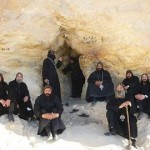The Lord, wishing to show that every commandment is obligatory but that sonship is a gift bestowed on human beings by means of his own blood, says, “When you have done everything that you were ordered to do, say, ‘We are worthless slaves, we have done only what we ought to have done”’ (Lk 17.10). …
The Lord, wishing to show that every commandment is obligatory but that sonship is a gift bestowed on human beings by means of his own blood, says, “When you have done everything that you were ordered to do, say, ‘We are worthless slaves, we have done only what we ought to have done”’ (Lk 17.10). Thus the kingdom of heaven is not a reward for works but is rather a master’s gift prepared for his faithful servants.’
A slave does not demand freedom as a reward, but rather satisfies his master as someone who is indebted to him and who waits for his freedom as a gift.
“Christ died for our sins in accordance with the Scriptures” (1 Cor 15:31), and to those who serve him well he gives freedom as a gift, for he says, “Well done, good and faithful servant; since you have been trustworthy in a few things, I will put you in charge of many things. Come share in your master’s joy” (Lk 25:21).
The person who relies on mere knowledge is not yet a faithful servant; no, the faithful servant is the person who puts his faith in Christ by obeying what he commands.
The person who honors his master does what the master orders; when he makes a mistake or disobeys, he patiently accepts what is coming to him as something he deserves…
Some, without keeping the commandments, think they are keeping the faith, while others, keeping the commandments, expect to receive the kingdom as a reward owed to them. Both are deprived of the kingdom.
A master has no obligation to reward his slaves, nor, on the other hand, will those who are not faithful servants receive their freedom. If “Christ died for us in accordance with the Scriptures” (1 Cor 15:3) and “we do not live for ourselves but for him who died and was raised for us” (2 Cor 5:15), it is clear that we are obligated to serve him until our deaths. How then can we consider sonship something owed to us?
Christ is Master by essence and is Master by divine dispensation, because he has brought into being those who did not exist, and with his own blood has redeemed those who were dead in sin (Jn 1:3) and has given the gift of grace to those who thus believe (Rom 5:9; Rev 5:9).
When, therefore, you hear Scripture say, “He will reward each person according to his works” (Ps 62:12; Mt 16:27), it does not say that works deserve hell or the kingdom, but rather that works are done out of faith or lack of faith in him. Christ repays each person not as a businessman fulfilling his contracts but as God, our Creator and Redeemer.
We who have been considered worthy to receive the washing of regeneration (i.e. Baptism) offer good works not as repayment, but as a means of preserving the purity that has been given to us…
The person who does good and looks for a reward is not serving God but his own will. It is not possible for a sinner to escape retribution” except through repentance commensurate with what he has done.
Some people say, “We cannot be good unless we clearly receive the grace of the Spirit,” but those who are inherently disposed to seek pleasures always decline to do what lies within their power, because they say they are helpless to do differently.
Grace has been mystically bestowed on those who have been baptized in Christ and becomes active in them to the extent that they keep the commandments. Grace never ceases to secretly help us but it is up to us, as far as it lies within our own power, to do good or not to do good. Grace first rouses the conscience in a manner that conforms to God’s wishes; that is how even evildoers have repented and come to please God. Again, grace may be hidden in a neighbor’s advice. There are times when it also accompanies one’s thoughts when one is reading and, as a natural consequence, teaches the mind the truth about itself. If, therefore, we do not hide the talent that has in consequence been given to us (Mt 25:20-25), we shall without a doubt enter into the Lord’s joy.
The person who seeks out the activities of the Spirit before he keeps the commandments is like someone who sells himself into slavery: As soon as he is bought, he seeks to be given his writ of Freedom – along with his purchase price.
Join Us: Sign Up Today!
Tags:












